The conclusion of the federal election marks the start of a new chapter for Canada. Leaders must respond to the priorities that Canadians have voiced and take decisive steps to advance our shared prosperity. Across the country, people are engaging deeply in conversations about economic opportunity, housing affordability, climate resilience, and access to quality healthcare. At the heart of these discussions is a growing concern for the well-being and success of future generations. As global events and trade tensions escalate, the need for bold choices that will secure a better future—for today’s Canadians and those to come—has never been more urgent.
BCG’s Missions for Prosperity report outlines six levers that our analysis shows are essential for sustainable growth. Now, we supplement this with findings from a national survey of 3,000 Canadians to understand their attitudes towards growth and their expectations concerning their own and the country’s prosperity. The resulting insights provide decision makers with critical intelligence into consumer demand, regional growth opportunities and areas for strategic investment.
Here’s what we learned.
- Compared to peer nations, Canadians still rate their country highly: especially on quality of life, democracy, and fairness. But only 12% believe that future generations will be better off.
- Canadians are calling for a new economic playbook: 67% of Canadians view economic growth as essential, up from 36% in 2024. Nearly 9 in 10 say it’s time for a fresh strategy.
- Infrastructure projects draw broad support: Nearly 4 times more Canadians support large-scale backbone initiatives—such as pipelines, LNG terminals, and critical minerals—than oppose them.
- Growth must support key social needs: 94% say affordable housing and better healthcare are vital outcomes in a strong economy—not side benefits.
Pride in Canada, Worries about the Future
Canadians are proud of their country’s quality of life, democracy, and fairness. Over half see the country as leading on these core dimensions, compared to other global peers. (See Exhibit 1.)
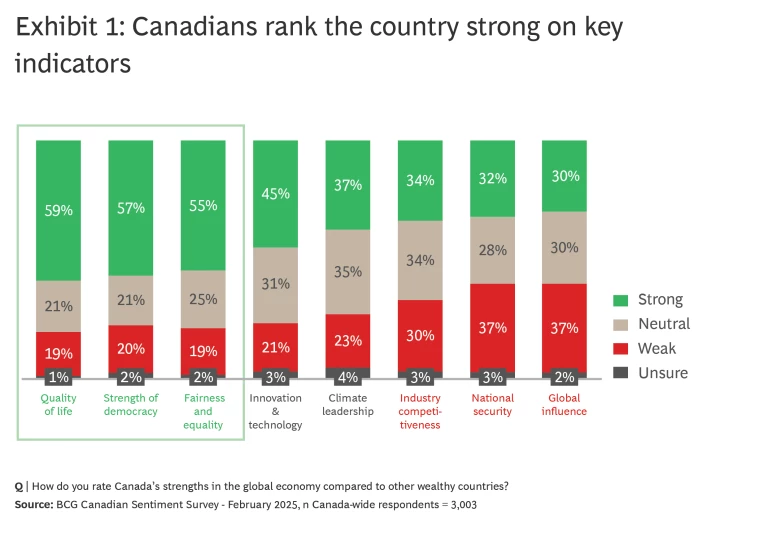
Stay ahead with BCG insights on customer insights
But concerns are mounting. Just 12% believe the next generation of Canadians will be better off economically. (See Exhibit 2.) Many fear future generations will face worse access to healthcare, housing, and a healthy environment. And a third view the country as weak relative to its peers in industry competitiveness, national security and global influence.
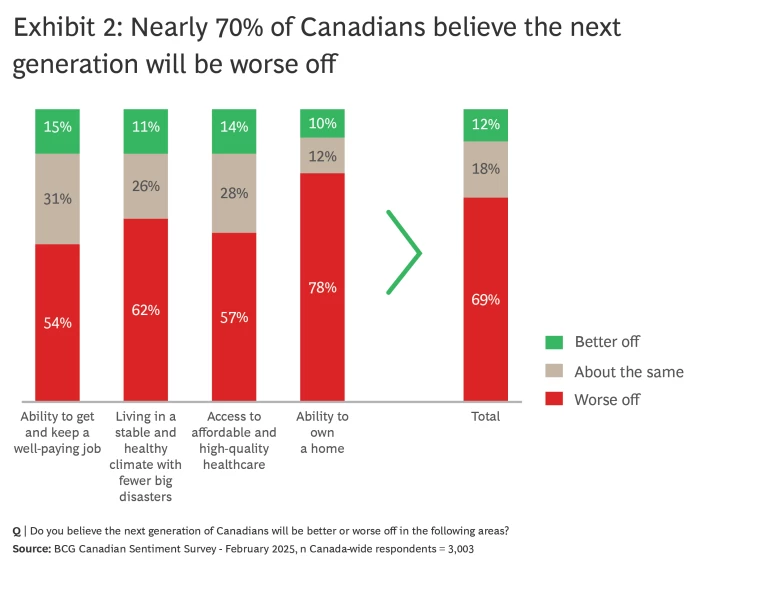
In this context, support for growth is surging. (See Exhibit 3.) Canadians are calling for a new economic strategy: one that expands opportunity, delivers higher wages and good jobs, and strengthens the country’s competitive edge. Two thirds now view economic growth as essential—almost double the number who said so a year ago. And close to 90% say Canada needs a bold new direction.
Instead of incremental progress, these findings suggest Canadians want a step-change.
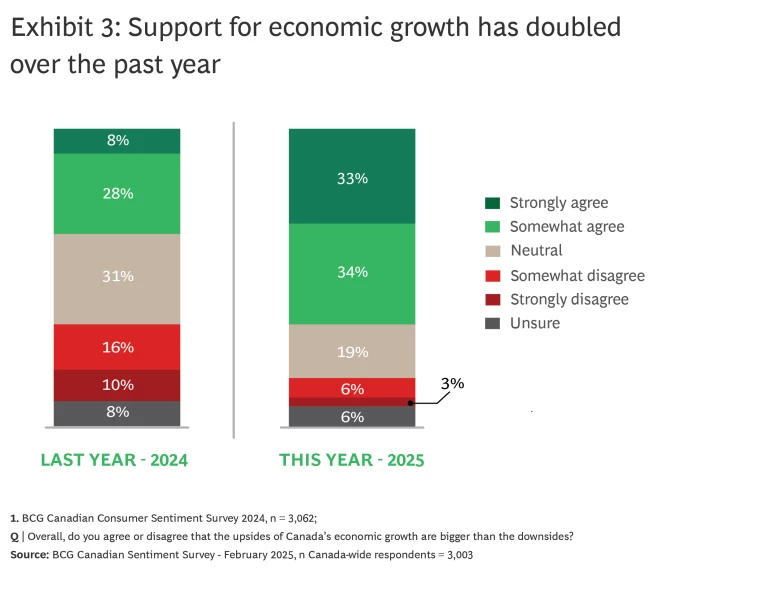
Calls for Bolder Ambition
Eighty eight percent of Canadians believe the country needs a new economic strategy, with
energy as a major underpinning. Canadians are in favour of large-scale infrastructure initiatives that can boost jobs, expand trade and deepen national resilience. West-to-East pipelines that could reduce reliance on foreign inputs receive strong support. Many also want new liquid natural gas terminals, and stronger investment in nuclear energy capabilities. These major initiatives promise significant energy security, diversified trade routes, and thousands of high-quality jobs.
But Canadians also want leaders to diversify. Over 60% believe taxpayer funds should also go toward the mining of critical minerals. And half want to see greater government investment in semiconductors and advanced computer technologies—sectors that have the potential to position Canada as a global leader in the AI economy.
Values Still Matter
While growth in key industries is seen as essential, there is also an overwhelming belief among Canadians that growth must align with core social and environmental priorities. Strong social services—particularly healthcare, affordable housing, and reliable transportation infrastructure—were consistently identified by survey respondents as essential for living a good life, along with responsible environmental actions.
Healthcare is the top social priority for Canadians. Ninety-four percent cite fast, high-quality care as essential, yet only a third report a positive experience with the current system—especially around access, affordability, and mental health. Across the country, people feel the healthcare system is failing them. (See Exhibit 4.)
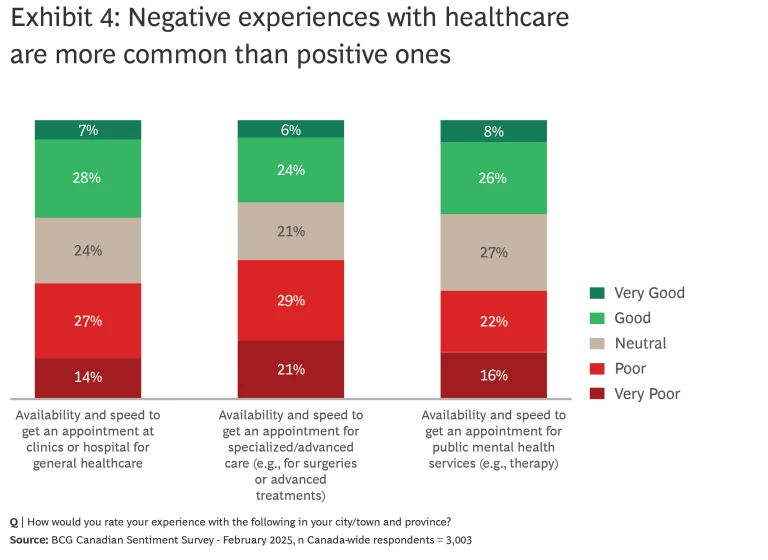
Affordable housing remains a top priority, with 94% of Canadians saying it’s fundamental to building a stable and secure life. But affordability is slipping out of reach—and 78% of the country believes the next generation will be worse-off when it comes to home ownership.
Environmental sustainability is another deeply held Canadian value. While support for new energy and mineral projects is high, 85% of survey respondents believe that sustainable practices can—and should—be integrated into economic growth. The responses show that Canadians are looking for practical actions to protect the environment, without sacrificing the economic prosperity that enables investments into key social services.
A Shared Goal, Different Realities
Income levels also shape the economic outlook. Nearly 40% of Canadians say they are worse off financially than five years ago. And the lower the income bracket, the more vulnerable they feel. As living costs outpace wage growth, low-income Canadians are three times more likely than top earners to say their financial position has deteriorated. The gap is just as stark when it comes to saving: while 84% of high earners say they can put at least a little money aside, only 35% of low-income Canadians say the same. (See Exhibit 5.)
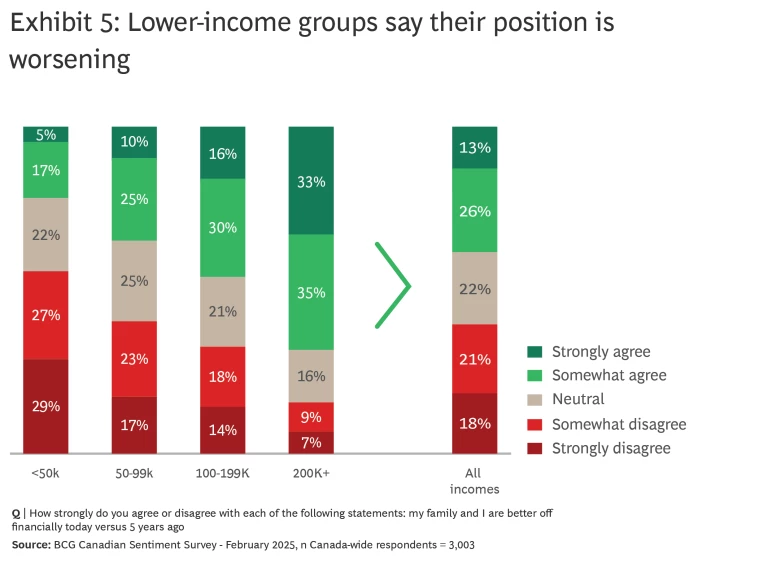
Who you are and where you live matter. What older Canadians want now is convenient, accessible healthcare services. They are far more likely than younger Canadians to express dissatisfaction with appointment accessibility. Younger Canadians want business and policy leaders to secure the future. In healthcare, These generations are more likely to advocate for actions on climate change such as adopting green technologies and investing in green energy. They see environmental health as intrinsically connected to their economic futures.
The Road Ahead
As Canada navigates an uncertain global landscape, one message is clear. Canadians want a resilient, self-sufficient economy that delivers prosperity while staying true to core social values. While there’s broad agreement on key priorities and the need for bold action, important differences emerge across income levels, generations, and regions. This moment provides a real opportunity for leaders to weigh these perspectives and turn nuanced public sentiment into tangible outcomes.
The path forward won’t be easy, but it offers a rare chance to reshape Canada’s trajectory. The Missions for Prosperity report outlines a roadmap for progress, bringing together policymakers and business leaders to take on the country’s most urgent challenges. With the election behind us, now is the time to act—and deliver the transformative change that Canadians desire.





